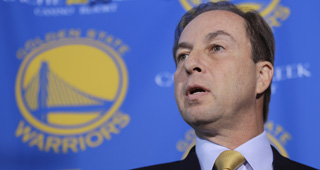With all of the commotion going on concerning the Warriors’ announcement of their move to San Francisco this week, it seemed only proper to throw my opinion into the mix. Since there are different and strangely somewhat separate components of the situation, I will go through them one at a time.
The business aspect
I stand in a somewhat unique position to dissect the financial piece of this transaction because of my dual roles over the past few years. Over the last 18 months, my day job has been with a ticket broker who buys and sells tickets both locally and nationally. One of the consistent points of interest over that period of time has been the lack of a proper mid-size venue for concerts and other major events in San Francisco. Prominent artists like Bruce Springsteen, Lady Gaga, and Jay-Z have had to make the decision to either play an ill-fitting venue in San Francisco, or a more size-appropriate one in Oakland (Oracle Arena) or San Jose (HP Pavillion). Considering both the cachet of San Francisco to non-locals and the solid music scene in the city already, an arena like the one the Warriors are building needed to happen with or without the team.
As such, ownership is taking a different kind of risk with this arena. By being able to be the most prominent name in town for non-sports acts, Joe Lacob and company can assure a level of financial security that leasing Oracle or sharing the profits with the Giants simply cannot match. As always, a downside risk persists, yet the specific nature of the San Francisco cultural scene makes that pretty unlikely even if the team that serves as the primary residents of the facility do not bring the thunder economically (which they will).
In terms of the Warriors, the dynamics are a little bit different. Since the team had not had too many problems selling seats even for a team that did not deserve that level of support, the question must be whether additional revenue from suites and advertising can offset or surpass the change in clientele which will accompany the shift. This question does not have a clear answer at this time and does not need one since the non-Warriors part of the arena should be such a resounding success in both the short and long term once it opens.
The Warriors aspect
Having Lacob, Peter Guber, and the rest of the ownership group make money is all well and good but does not necessarily do anything to make the team they own any more successful in terms of winning games. With full consideration for the factors that have changed in the new Collective Bargaining Agreement, the only ways a new arena can make the team better are an increased willingness to add salary and salary-related expenses and improving what I call the “Mark Cuban amenities.”
To their credit, ownership has already shown that they will pay the full salary cap for a team both now and moving forward- the Richard Jefferson deal showed that pretty clearly. The problem here is that teams in this situation have less ways to use that financial advantage than they did previously. Having a cap on how much cash can be used in trades and stricter luxury tax rules will end up doing a pretty good job of keeping a vast majority of teams within a certain range of spending on player salary pieces. As such, the only way Lacob and crew can make a dent on this end would be if they can dip into the luxury tax. That kind of move would give the Warriors a competitive advantage over many other league teams and could be a major help in terms of the mitigation of the damage caused by mistakes even without the amnesty provision.
Without the luxury tax, teams have a much smaller toolbox they can use to improve the win/loss situation for a team. In effect, what is left are improvements to coaching and facilities since those are not constrained by the same rules. I call these the “Mark Cuban amenities” because Cuban stands out as an owner willing to use his significant means to actually make the player and coach experience better in a way that affects the decision-making of free agents, otherwise known as the way these kind of changes matter. By either spending in the money to bring in quality non-player talent (can I get an “SVG” chant?) or improving things like the practice facilities and transportation, the Warriors can put themselves in a different place with potential players.
Each of these two major strains requires an outsized investment compared to what ownership has previously showed and are the only ways that a new arena will actually improve the quality of the franchise in the only way that truly matters.
The PR aspect
Over the course of the last few days, my overwhelming sense has been “why now?” because I cannot for the life of me figure out the incentives for such a grossly premature announcement. The biggest problems with the timing are the fact that there are so many issues still left to resolve and that even under ideal circumstances the team would not be leaving for a long time. In effect, they have told Oakland and the fans who care about the team staying in the East Bay “thanks but no thanks” without breaking it off just yet. People have tried to make analogies to other relationships yet there are no true parallels because of how insane the situation has become. After all, who can say “I’m going to break up with you in five years and you cannot leave before then” with a straight face? Furthermore, doing so without all of the kinks ironed out hurts their leverage with other locations should the perilous standing at Piers 30/32 fall through. This move changed dynamics with the Giants group in a way that would not help negotiations if the worst happens.
On top of that, making a press conference like the one on Tuesday does nothing to change public sentiment on the issue in ways that matter to the success of the project. San Francisco seems happy enough to get the team as long as the money does not come from public financing. Trying to get San Francisco to pay for a sports arena is harder than selling ice to an Eskimo- it is closer to selling asbestos.
The fan aspect
As has been the case with many other decisions since the team was purchased, it seems that the announcement of the San Francisco arena twinkle in their eye was done with little understanding of the ramifications of their actions. Much was made of the infamous booing Joe Lacob received at the Chris Mullin jersey retirement, with a vast majority of that attention going on the Monta Ellis trade which had just occurred. Beyond all the other factors (a horrific first half in that specific game, a disappointing team, and Lacob speaking AFTER the honoree), one other major one was the resentment that some fans felt towards an ownership group that always had at least one eye towards San Francisco despite already being in a city where they had phenomenal support from their fans.
Let’s be clear here- this is not a situation like Candlestick where a team had a fatally flawed situation and had to make their way out of it. As much as I think the building of an arena makes too much financial sense to pass up, Warriors brass needs to tread very lightly in their rationale for making the move. After all, Golden State has an atmosphere at Oracle which they undoubtedly will lose in the short trip across the bay (and reshuffling of prices and season ticketholders) just like the Giants did. The difference in this case is that this break-up will happen over a longer period of time and shifts the fanbase more significantly than either the Giants of 49ers changes in address. Lacob, Guber, and the rest would be wise to bend over backwards praising the fan involvement at Oracle and emphasizing the truth that the energy will change in the new place- anything less would be either false, disingenuous, or both.
In short, the move of the Warriors from Oakland to San Francisco will have a much bigger effect on ownership’s pocketbooks than the actual quality of the team on the floor. I sincerely hope that management understands the perilous ground they tread on and use honesty and respect in lieu of grandiose gestures and unnecessary promises in the weeks, months, and years until the change finally comes.



